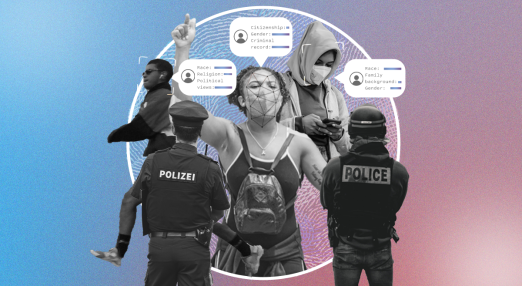Belgium’s data retention law must not undermine people’s right to privacy
Belgium's Parliament will soon vote on the draft law on the collection and retention of identification data and metadata in the electronic communications sector and the provision of such data to authorities. This draft law, as it is and if adopted without adequate adjustments, would pose a threat to people’s rights, such as the right to privacy and data protection, freedom of expression and information, press freedoms and professional secrecy guarantees, and would potentially set a dangerous precedent for other Member States.
Filter resources
-

Belgium’s data retention law must not undermine people’s right to privacy
Belgium's Parliament will soon vote on the draft law on the collection and retention of identification data and metadata in the electronic communications sector and the provision of such data to authorities. This draft law, as it is and if adopted without adequate adjustments, would pose a threat to people’s rights, such as the right to privacy and data protection, freedom of expression and information, press freedoms and professional secrecy guarantees, and would potentially set a dangerous precedent for other Member States.
Read more
-

Bits of Freedom files a complaint against intelligence services on behalf of millions of citizens
The Dutch secret services are illegally storing the data of millions of citizens. The supervisor does not have the means to do anything about this violation of the law, so EDRi member Bits of Freedom filed a formal complaint. It is high time that the secret services started to abide by the law. Our data should be removed from their servers.
Read more
-

Policing: Council of the European Union close to approving position on extended biometric data-sharing network
The Council of the European Union is close to reaching an agreement on its negotiating position on the 'Prüm II' Regulation, which would extend an existing police biometric data-sharing network to include facial images and offer the possibility for national authorities to open up their databases of "police records" for searches by other member states.
Read more
-

European Commission must uphold privacy, security and free expression by withdrawing new law, say civil society
In May, the European Commission proposed a new law: the CSA Regulation. If passed, this law would turn the internet into a space that is dangerous for everyone’s privacy, security and free expression. EDRi is one of 134 organisations calling instead for tailored, effective, rights-compliant and technically-feasible alternatives to tackle this grave issue.
Read more
-

Stop data retention in Germany and the European Union
Germany must show true leadership and set a strong precedent in the EU against the use of mass data retention to fight serious crimes. Mass data retention is one of the most privacy-intrusive instruments that treat everybody as criminals by presumption. It is high time that European governments implement rights-respecting and proportionate solutions in police investigations. Read the open letter EDRi and 12 civil society organisations sent to the German ministers of the Federal Ministry of the Interior to urge them to stop the use of data retention practices in crime investigations.
Read more
-

Collective complaint against the Technopolice
Today, we have come to a point where the combination of these technologies creates a state of total surveillance in our streets:CCTV everywhere, enormous police databases, facial recognition and automated detection of behavior. In order to end stop this illegal mass surveillance, LQDN is launching a collective complaint against the French Ministry of the Interior. You will find the details of their argument and procedure on plainte.technopolice.fr (in French).
Read more
-

How a Hollywood star lobbies the EU for more surveillance
The European Union debates a new law that could force platforms to scan all private messages for signs of child abuse. Its most prominent advocate is the actor Ashton Kutcher.
Read more
-

The voices of human rights defenders affected by the Pegasus spyware must be heard
EDRi and 22 civil society organisations urge the established European Parliament’s Committee of Inquiry to investigate the use of Pegasus and equivalent surveillance spyware to ensure that the systematic targetting of human rights defenders with these technologies is fully examined by the Committee, and that the voices of human rights defenders affected are heard.
Read more
-

Private and secure communications attacked by European Commission’s latest proposal
On 11 May, the European Commission put forward a proposal for a ‘Regulation laying down rules to prevent and combat child sexual abuse’ to replace the interim legislation that EDRi fought against last year. In our immediate reaction, EDRi warned that the new proposal creates major risks for the privacy, security and integrity of private communications, not just in the EU, but globally. Here, we unpack a bit more about the legislative proposal, and why we are so concerned.
Read more
-

Regulating Migration Tech: How the EU’s AI Act can better protect people on the move
As the European Union amends the Artificial Intelligence Act (AI Act) exploring the impact of AI systems on marginalised communities is vital. AI systems are increasingly developed, tested and deployed to judge and control migrants and people on the move in harmful ways. How can the AI Act prevent this?
Read more
-

Europol’s ever-increasing mandate: European Parliament failed to stand up for fundamental rights
Today, 4 May, Members of the European Parliament (MEPs) approved the revision of Europol’s mandate and the Schengen Information System. This supports a massive, unchecked expansion of Europol’s powers, posing a threat to people’s rights through over-policing, mass surveillance and discrimination.
Read more
-

Portugal: Constitutional Court strikes data retention down
On 19 April 2022, at the request of the Ombudsperson, the Portuguese Constitutional Court declared the unconstitutionality of the Portuguese data retention law.
Read more
